Teen Wants To Know If She's Wrong For Refusing To Walk The Dog While Her Mom Has A Broken Ankle
When one or both parents consistently favor one child over another, it is known as parental favoritism. It can involve spending more time with a particular child, having fewer rules with them, and giving them more privileges.
As parents, we often make an effort to maintain objectivity and treat all of our kids fairly. But then, that task is far more difficult than it appears.
The oldest child or the newborn is typically the favorite. Being raised in a home where parental favoritism is prevalent has detrimental long-term implications.
The greatest long-term risks are performance anxiety for both favored and unfavored youngsters, as well as sadness, instability, or even traumatic reactions in interpersonal relationships. The OP in today's story happens to be the unfavored child as her mom waits for her hand and foot on her younger brother.
The 16-year-old also added that she and her brother suffer from anxiety. Her mom's favoritism showed all the more when she broke her ankle and couldn't walk the dog.
So she asked the OP to do it, despite knowing that the OP was not in the house from 6 a.m. until 6 p.m. And then when the OP returns home, she is either doing homework or working at her part-time job.
She suggested that her brother walk the dog since he literally does nothing else, but it sparked an uproar instead. Read the full story for yourself below.
The Headline...

My brother is pretty much waited on hand and foot by my mum
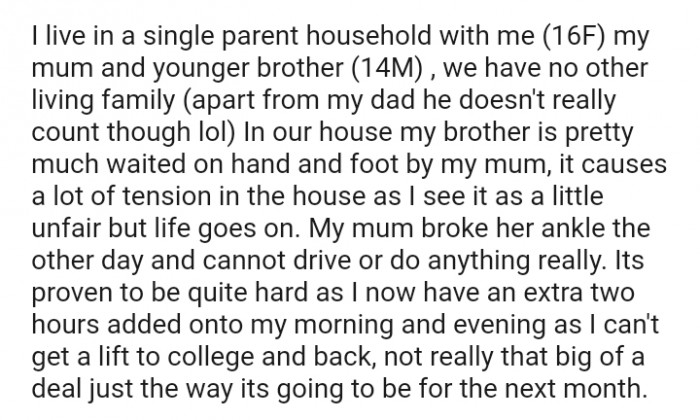
The OP has asked me to walk our dog once or twice a day
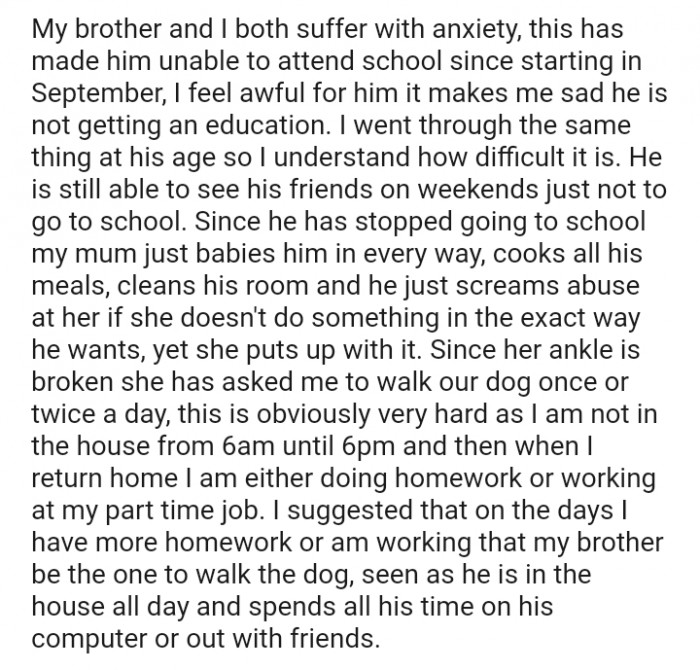
The Impacts of Unequal Responsibilities
Unequal distribution of responsibilities within families can lead to significant tension and resentment. According to research from the Journal of Family Psychology, when one member feels overburdened, it can create feelings of anger and frustration, particularly if they perceive their needs are being overlooked. In this case, the teen's reluctance to walk the dog reflects a sense of injustice regarding family responsibilities.
Understanding these feelings can be crucial in addressing the dynamics at play.
The Impact of Unequal Responsibilities
Research in family psychology shows that unequal distribution of responsibilities, such as pet care, can lead to significant stress and resentment among family members. When one person feels overburdened, it can create tension and conflict within the household.
This phenomenon is often compounded when family members perceive that their contributions are undervalued or overlooked.
She claims he is not able to walk the dog due to his anxiety
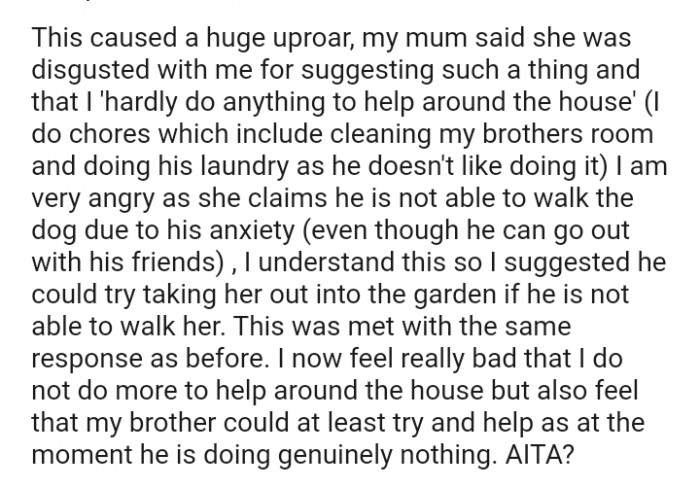
He lost interest in her when he moved up to high school
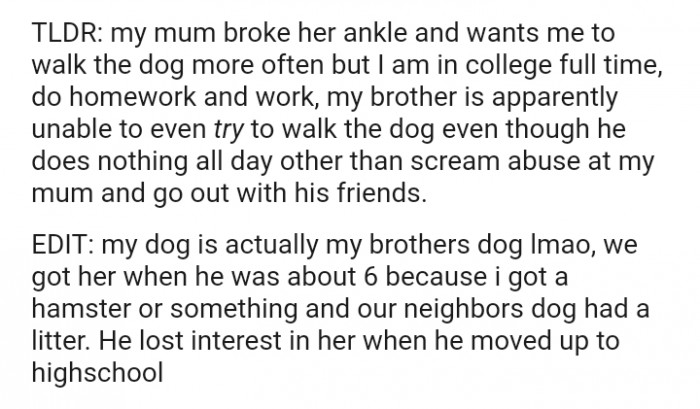
Here are some of the topmost comments from this thread...
The OP's mother needs to stop enabling her son

Furthermore, the concept of 'role strain' may also be relevant here. Role strain occurs when individuals feel unable to fulfill the expectations associated with their roles, leading to stress and conflict. The teen's refusal to walk the dog while her mother is incapacitated may stem from feeling overwhelmed by the additional responsibilities placed on her, particularly if she perceives them as unfair.
This dynamic can exacerbate sibling tensions and feelings of resentment within the family.
According to attachment theory, the dynamics of sibling relationships can be influenced by how responsibilities are shared. A study published in the Journal of Family Psychology indicates that siblings who equally share responsibilities tend to develop healthier relationships.
On the other hand, disparities can lead to feelings of jealousy and competition.
The OP's mom is enabling her son

This Redditor thought she was after the title

The mother and brother are both behaving like AHs

Navigating Family Dynamics
Family dynamics can often benefit from open communication and negotiation. Research shows that families who engage in discussions about responsibilities and expectations tend to experience higher levels of satisfaction and lower levels of conflict. The teen may benefit from discussing her feelings with her mother, articulating her concerns about the unequal burden of care and how it affects her.
This dialogue can foster understanding and potentially lead to a more equitable distribution of responsibilities.
Encouraging Cooperative Efforts
To mitigate feelings of resentment and promote cooperation, families can establish clear expectations around pet care duties. Research supports that when responsibilities are clearly defined, family members feel more accountable and engaged.
This clarity can lead to more positive interactions and reduce conflict.
This Redditor is suggesting for the OP to move out
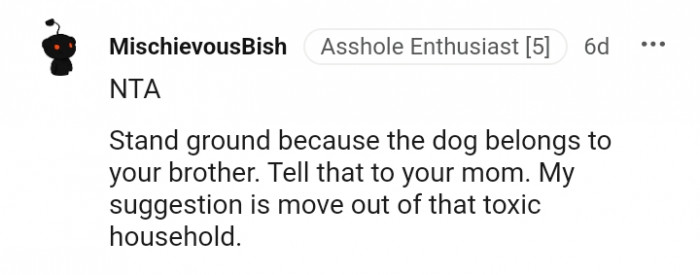
The dog is the innocent victim in this
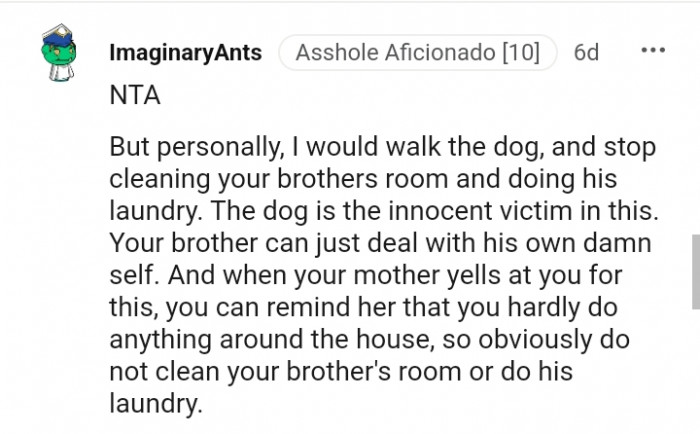
You do not have time for both chores

Additionally, exploring the concept of 'family systems theory' can provide insight into how individual behaviors impact family dynamics. According to Dr. Murray Bowen, family members often influence each other's behaviors and emotional responses. The teen's reluctance to walk the dog may impact her mother's feelings of guilt or frustration, creating a cycle of negative emotions that can further strain their relationship.
Recognizing these interconnected dynamics is essential for resolving conflicts effectively.
Moreover, encouraging open communication about feelings and expectations can help alleviate tensions surrounding pet care. Studies show that families who practice effective communication tend to have lower levels of conflict and higher overall satisfaction.
Creating a space for dialogue can foster understanding and strengthen family bonds.
The OP's brother will have no life skill at this rate
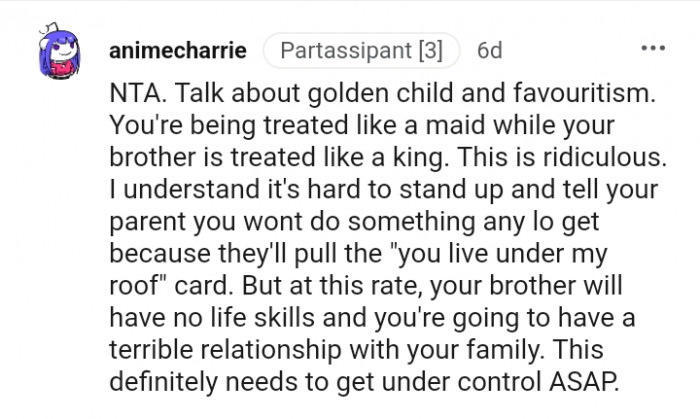
Your mom is not going to change her thinking anytime soon
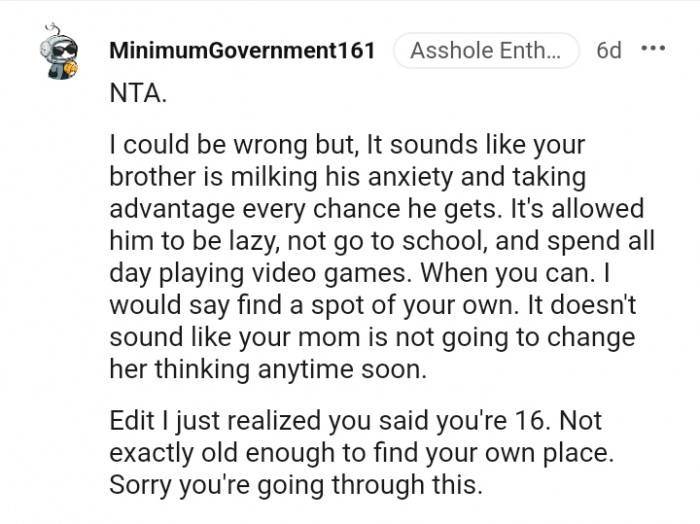
Anxiety isn't an excuse to be a hermit
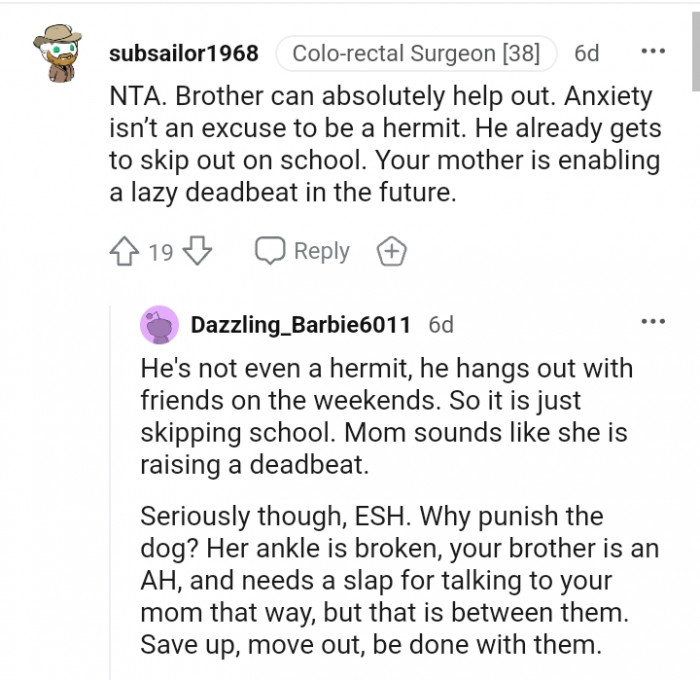
Practical Solutions for Improved Communication
To improve family dynamics, setting clear expectations and boundaries around responsibilities is crucial. Creating a family agreement that outlines who is responsible for what can help clarify roles and reduce feelings of resentment. Implementing regular family meetings to discuss responsibilities can also enhance communication and foster collaboration.
Research indicates that families who practice open dialogue about responsibilities tend to have more harmonious relationships.
The Importance of Shared Experiences
Engaging in shared experiences related to pet care can also enhance family dynamics. Research indicates that families who participate in joint activities, such as walking the dog or grooming, report stronger emotional connections.
These shared experiences can build teamwork and reduce feelings of isolation among family members.
Your suggestion sounds reasonable
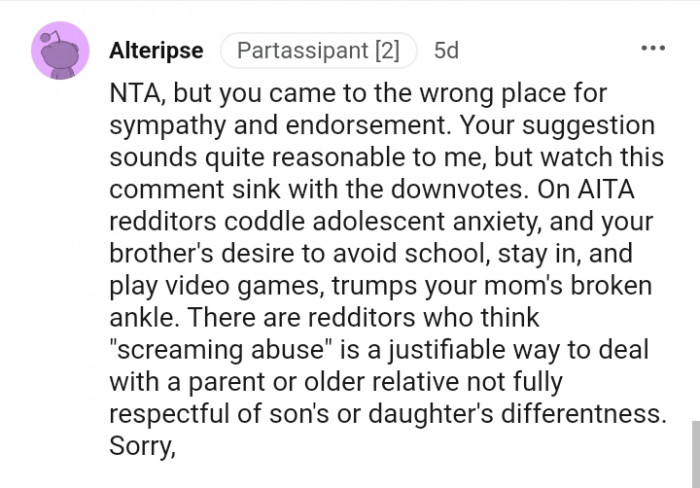
I feel for you and the dog
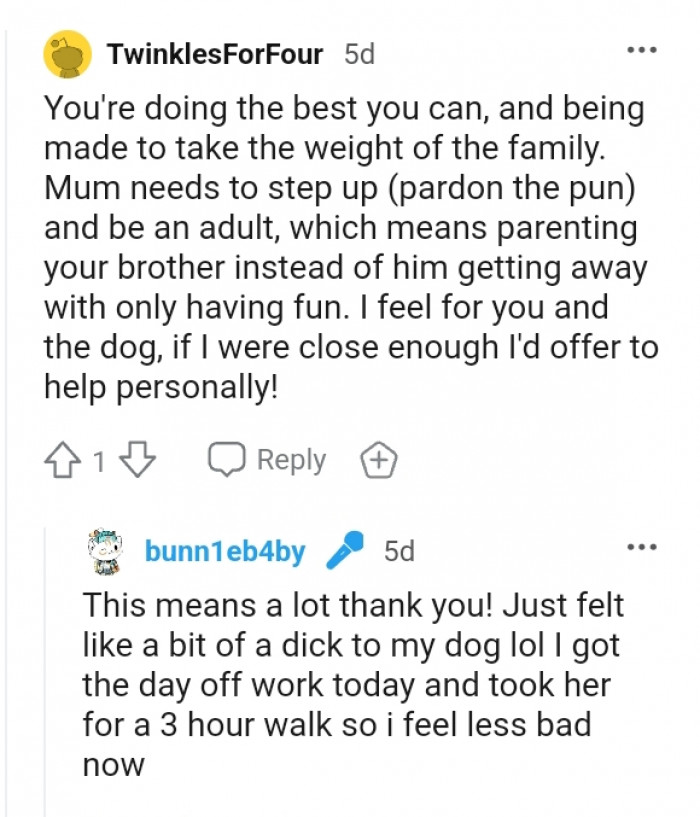
You need a drug and alcohol course

Moreover, considering a compromise where the teen can share the responsibility with her mother can create a more balanced approach. For example, offering to walk the dog on alternate days or enlisting help from other family members can alleviate the burden. Studies show that collaborative efforts in caregiving can enhance feelings of teamwork and reduce individual stress.
By working together, the family can foster a more supportive environment for all members involved.
Ultimately, fostering a cooperative environment requires ongoing effort and commitment from all family members. By working together and supporting one another, families can create a more harmonious atmosphere for both themselves and their pets.
Establishing a culture of teamwork can transform potential conflicts into opportunities for bonding.
The OP's brother should help out
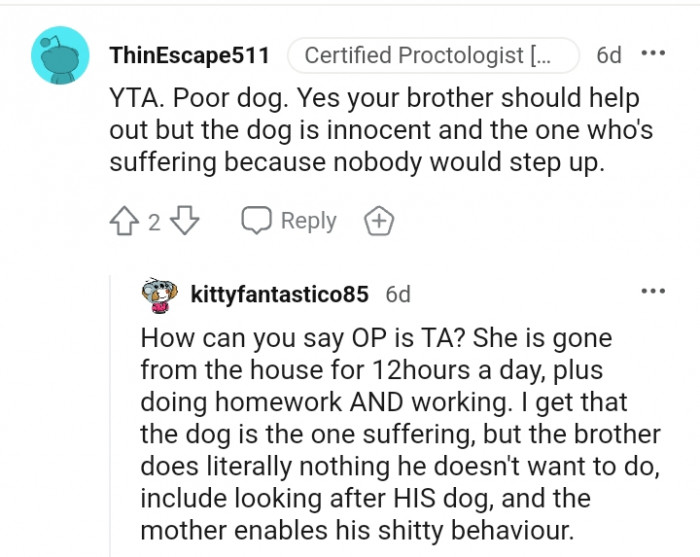
Sounds like the fog needs a better home

The dog is bring walked by the OP

Take care of the fur baby

It is a short thing, not long term
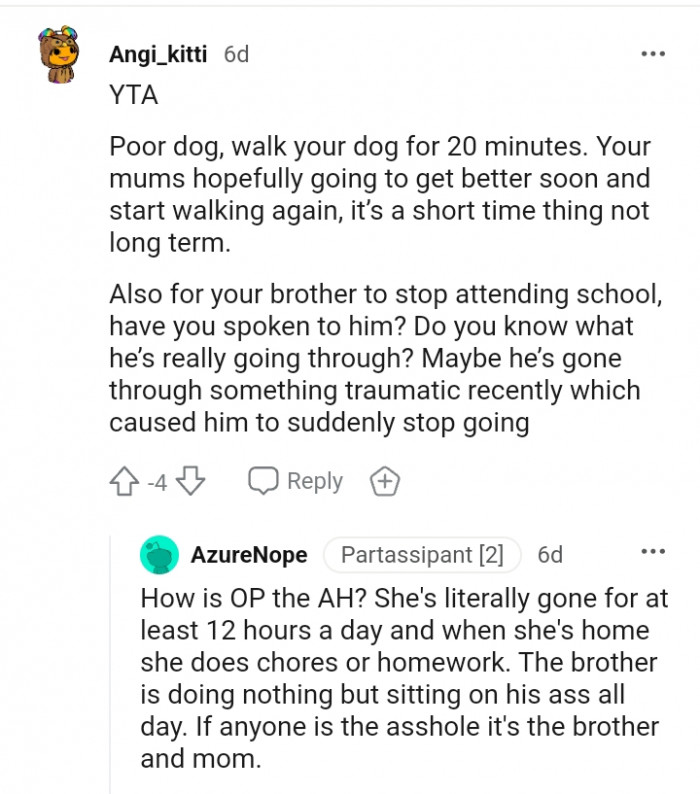
Yes, you have a special place in your heart for your firstborn, yet a newborn needs continual care. Parents of children with illnesses or special needs occasionally feel more connected to them.
In these situations, parents frequently talk to all of their kids about the different treatments to make sure they understand it's not personal. But that's not the case here and it's really sad to see someone treated unfairly.
Psychological Analysis
This situation highlights the emotional strain that arises from unequal responsibilities in pet care. It's essential for family members to communicate openly and work together to foster a supportive environment.
Analysis generated by AI
Analysis & Alternative Approaches
In conclusion, addressing unequal responsibilities in pet care is vital for maintaining healthy family dynamics.
By promoting cooperation and open communication, families can reduce tension and enhance overall satisfaction.
Analysis & Alternative Approaches
In conclusion, addressing unequal responsibilities within families is essential for fostering healthy dynamics. Understanding the psychological principles at play can help families navigate conflicts more effectively.
Ultimately, fostering open communication and collaboration can lead to more equitable distributions of responsibilities, enhancing relationships and overall family well-being.



